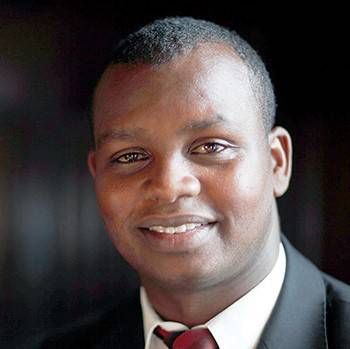Freddy Mutanguha
 Freddy Mutanguha
Freddy Mutanguha
Africa Representative
Aegis Trust
Freddy leads Aegis’ Champion Humanity™ education initiative, developed in Rwanda and also applied to prevent impending violence in the Central African Republic, South Sudan and Kenya.
A survivor of the 1994 Genocide against the Tutsi in Rwanda, he lost over 80 members of his family, including his parents and four of his younger siblings. Surviving as a teenager and with one younger sister, he founded a student survivor organization to support other orphans, worked his way through school, gaining a Bachelor’s Degree in Education and a Master Degree in Project Management. In addition to his duties with Aegis, he became Secretary General of IBUKA, the national umbrella association for Rwandan genocide survivors.
Freddy is an International Board member of the Centre for Justice and Reconciliation in Cambodia, a board member of the Miracle Corner Rwanda and an External Advisory Committee member of Visual History Archive: USC Shoah Foundation in Los Angeles. He lectures internationally on the impact of the Genocide and on post-conflict reconstruction.
In 2016, the Justice and Security Foundation declared Freddy a Peace Award winner for his outstanding contribution to Peace.
Aegis Trust
The Aegis Trust works to prevent future genocides and to promote humanity. We do this primarily through research, education and the dissemination of information and advice.
Aegis understands genocidal violence as an extreme outcome of a pathway of inhumanity, which can be countered at early stages, similar to disease prevention. Aegis recognizes that nutrition and food security are critical in this process, along with livelihoods, education and health.
Aegis has a global mission, with headquarters in the UK. Aegis has developed a methodology through its work in the UK and Rwanda that transforms hearts and minds. Referred to as Champion Humanity™, this methodology changes attitudes, leading to the creation of new and strengthening existing efforts towards building peace and social cohesion, key factors for food security.
The story of Aegis began 40 years ago by a single family from the UK. The Smith family established a small retreat house in 1978, which was to become the first Holocaust education centre in the UK, opening in 1995. This led to the formation of Aegis in 1999, and then the creation of the Kigali Genocide Memorial in 2004 and the Aegis Champion Humanity™ initiative.

